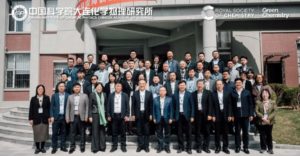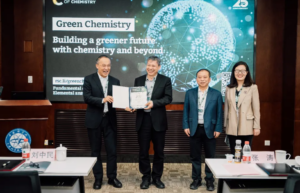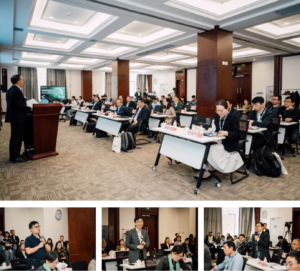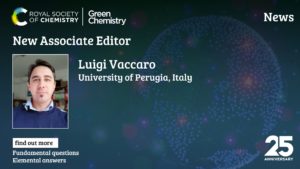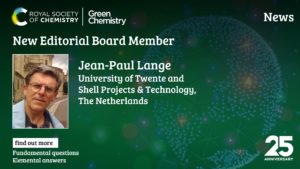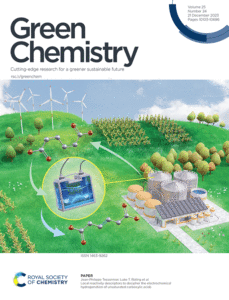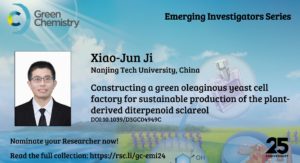
Green Chemistry is proud to present the Green Chemistry Emerging Investigators Series, showcasing work being conducted by Emerging Investigators. This collection aims to highlight the excellent research being carried out by researchers in the early stages of their independent career from across the breadth of green chemistry. For more information about this series, click here
The most recent contribution to this series, a Paper entitled Constructing a green oleaginous yeast cell factory for sustainable production of the plant-derived diterpenoid sclareol (DOI: 10.1039/D3GC04949C), presents a green, sustainable and efficient microbial synthesis of plant-derived sclareol through the construction of an oleaginous yeast cell factory. Sclareol is an important starting material for the synthesis of ambroxan, and it relies heavily on traditional plant extraction. At present, ambroxan is widely used to replace the ambergris extracted from the endangered sperm whales.

Read our interview with the corresponding author below.
How would you set this article in a wider context?
The sclareol chassis strain here constructed paves the way towards a sustainable, large-scale fermentation-based manufacturing of other diterpenoid compounds. The findings of this study not only demonstrate the significant potential of microbial synthesis as an alternative pathway for generating structurally complex chemicals but also establish a model for the sustainable industrial production of other valuable terpenoids.
What is the motivation behind this work?
Ambergris is a waxy substance secreted from sperm whales and has a long history of use in perfume. Sclareol is an important synthetic raw material for ambergris substitute ambroxan. However, the major sources of sclareol still rely heavily on traditional plant extraction and the low concentration of sclareol in the plant as part of a complex mixture, requires laborious and costly purification processes. Alternatively, the rapid development of synthetic biology has enabled microorganisms to emerge as potential alternatives to conventional methods for sclareol production. Therefore, we choose the oleaginous yeast Yarrowia lipolytica as the ideal platform for sustainable production of plant-derived sclareol.
What aspects of this work are you most excited about at the moment and what do you find most challenging about it?
With the elaborate design of the sclareol biosynthesis pathway and tight regulation of cell metabolism, we finally achieved highest titer of microbial sclareol, this was the most excited aspects of the entire work. The most challenging is how to well control the synthesis of unwanted byproducts caused by metabolic imbalance. We first engineered plant enzymes to improve their catalytic activity in Yarrowia lipolytica, then constructed scaffold-free multienzyme complexes with the peptide pair RIDD and RIAD to significantly alleviate the metabolic imbalance and decrease the synthesis of byproducts.
What is the next step? What work is planned?
We would like to conduct a follow-up research with further optimization of metabolic network, such as extending cytosolic acetyl-CoA pool by regulating the lipid metabolism, engineering secretion systems through specific transporter identification, and enhancing the supply cofactor NADPH. In addition, we will further achieve the production of other high-value terpenoid compounds in the oleaginous yeast chassis.
Please describe your journey to becoming an independent researcher
My academic career began after I graduated from the undergraduate program and continued my graduate studies at Nanjing Tech University, China. The transformation from a novice in scientific research to an independent researcher was due to the guidance of three supervisors. The first supervisor is Prof. He Huang, who directed my doctoral thesis at the Jiangsu Provincial Innovation Center for Industrial Biotechnology. As one of the first batch graduate students of Prof. He Huang, I received his meticulous guidance step by step, from specific experimental operations to control of the developing trends of the entire bioindustry. Thanks to his helpful cultivation, my doctoral thesis won the National Outstanding Doctoral Thesis Nomination Award of China. The second supervisor is Prof. Pingkai Ouyang, who directed my postdoctoral research at the National Research Center for Biotechnology. It was Prof. Pingkai Ouyang who taught me to dig deep into the details and try to be unique in scientific research. The third supervisor is Prof. Jens Nielsen, who was my supervisor when I was conducting visiting research at Chalmers University of Technology, Sweden. It was Prof. Jens Nielsen who made me understand the convenience of focusing on a certain microorganism to carry out scientific research and the importance for creating my own academic label. During my visiting researches in his laboratory, I gained a lot of experience in yeast synthetic biology, and further strengthened my training as a biochemical engineer and broadened my interdisciplinary research experiences. These educational and collaborative experiences taught me how to run and effectively manage a laboratory, how to design research projects, and ultimately trained me to become an independent researcher specializing in “synthetic biology driven biomanufacturing”.
Can you share one piece of career-related advice or wisdom with other early career scientists?
I want to share with you George Bernard Shaw’s famous quote about sharing apple: If you have an apple and I have an apple, and we exchange apples, we both still only have one apple. But if you have an idea and I have an idea, and we exchange ideas, we each now have two ideas.
Why did you choose to publish in Green Chemistry?
Green Chemistry is a top-tier, highly respected journal with a broad readership all over the world. This journal provides a unique forum for the publication of innovative research on the development of alternative green and sustainable technologies. Our present article is highly compatible with this scope. Therefore, we have an idea of publishing our work in this prestigious journal.
Meet the author
 Prof. Xiao-Jun Ji received his BSc and PhD from Nanjing Tech University in 2005 and 2009, and conducted the visiting research in the Systems and Synthetic Biology lab headed by Professor Jens Nielsen at Chalmers University of Technology, Sweden, during 2016 and 2017. He has received many awards such as the Fok Ying-Tung Foundation Young Scholars Award (2014), the National Technological Invention Award of China (2018), the Excellent Young Scholars of National Natural Science Foundation of China (2019), the Newton Advanced Fellowships of the Royal Society (2020), etc. His recent research focuses on bio-manufacturing of pharmaceutical and nutritional chemicals using the non-conventional yeast through metabolic engineering and the emerging synthetic biology tools.
Prof. Xiao-Jun Ji received his BSc and PhD from Nanjing Tech University in 2005 and 2009, and conducted the visiting research in the Systems and Synthetic Biology lab headed by Professor Jens Nielsen at Chalmers University of Technology, Sweden, during 2016 and 2017. He has received many awards such as the Fok Ying-Tung Foundation Young Scholars Award (2014), the National Technological Invention Award of China (2018), the Excellent Young Scholars of National Natural Science Foundation of China (2019), the Newton Advanced Fellowships of the Royal Society (2020), etc. His recent research focuses on bio-manufacturing of pharmaceutical and nutritional chemicals using the non-conventional yeast through metabolic engineering and the emerging synthetic biology tools.
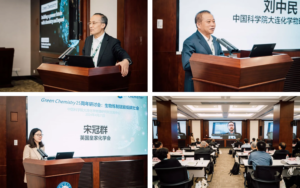 The opening ceremony was hosted by Prof. Tao Zhang (Director of the State Key Laboratory of Catalysis Fundamentals of the Dalian Institute of Chemical Physics and Green Chemistry’s Editorial Board Member), Prof. Zhongmin Liu (Director of the Dalian Institute of Chemical Physics), and Dr Guanqun Song (Regional Publisher at the Royal Society of Chemistry). Dr. Michael Rowan (Green Chemistry’s Executive Editor) also extended his welcoming to this event via video, and thanked the Dalian Institute of Chemical Physics for its support and contribution to this symposium. After the opening ceremony, Prof. Tao Zhang awarded the Green Chemistry Excellence certificate to the speakers.
The opening ceremony was hosted by Prof. Tao Zhang (Director of the State Key Laboratory of Catalysis Fundamentals of the Dalian Institute of Chemical Physics and Green Chemistry’s Editorial Board Member), Prof. Zhongmin Liu (Director of the Dalian Institute of Chemical Physics), and Dr Guanqun Song (Regional Publisher at the Royal Society of Chemistry). Dr. Michael Rowan (Green Chemistry’s Executive Editor) also extended his welcoming to this event via video, and thanked the Dalian Institute of Chemical Physics for its support and contribution to this symposium. After the opening ceremony, Prof. Tao Zhang awarded the Green Chemistry Excellence certificate to the speakers.

